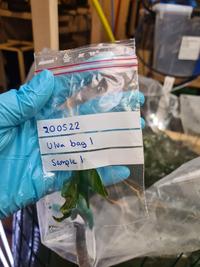
Co-farming of fed and extractive species in Swedish landbased recirculating aquaculture systems: effects on water quality, health and welfare
Short description
One of the cultivation strategies in marine aquaculture is integrated multi-trophic aquaculture (IMTA), where several species from different trophic levels are co-cultivated in the same, or connecting, water systems. Co-cultivation is based on the principle that excess nutrients from one species are utilized by another species, typically from a lower trophic level. This leads to an increased proportion of the initially added nutrition being utilized for biomass production, which improves the ecological sustainability of the aquaculture system.
This research project aims to study how co-cultivation affects the water quality of the system, as well as health and welfare of the farmed organisms.
More information
With a growing human population the demand and consumption of seafood increases. The declining amount of biologically sustainable wild fish stocks have led to an increased share of farmed fish in the global seafood consumption.
In marine aquaculture, monoculture is the most commonly occurring cultivation strategy, where species are cultivated in spatially separated locations. An alternative cultivation strategy is integrated multi-trophic aquaculture, where several different species are co-cultivated in the same, or connecting, water system. Furthermore, co-farming contributes to modifying new products for sale at the farm, thus also increasing the economic sustainability.
In addition to reducing the nutrient load from the fed farm, previous co-farming experiments have shown further positive effects on co-cultivation of organisms in comparison to monoculture farming.
For example, different filtering organisms such as oysters and mussels, grow better if they are co-cultured with fish than predicted from ambient nutrient levels. It has also been shown that algae grown together with other species have better quality and growth than when farmed separately.
New research in the field indicates that co-cultivation of different species can have positive effects on fish survival, growth, and immune system. The literature on such effects is still sparse, indicating a need to further evaluate the welfare aspect of co-cultivation.
This research project aims to study the effects of co-cultivation with various species of significance for the Swedish aquaculture industry. We will study effects on water quality in the RAS-system, but also effects on growth, health and welfare on the various farmed organisms.
